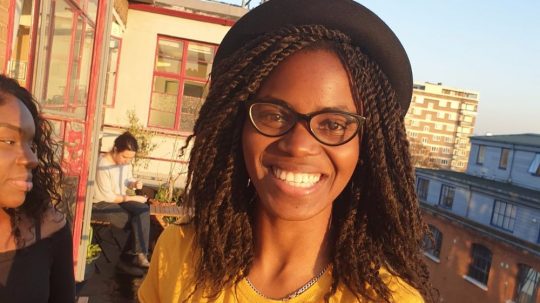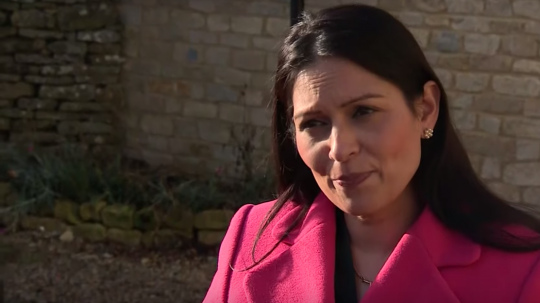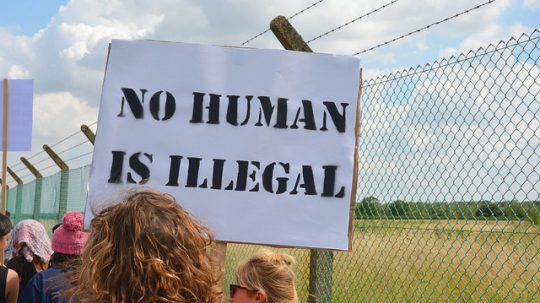
Dr Roghieh Dehghan Zaklaki: Hostile Environment creates an atmosphere of mistrust, loneliness, fear and isolation.
Feryal Awan: The Hostile Environment leads to scapegoating of migrants.
Gracie Bradley: The issue is the government not caring about the rights of those people. The Hostile Environment is a set of policies introduced in 2012 by Theresa May, aimed at making life really difficult for undocumented migrants.
Feryal Awan: By creating borders and immigration enforcement in all parts of society.
Gracie Bradley: Essentially the set of measures aims at excluding people from public services, outsourcing immigration enforcement to untrained people, like teachers, police officers or frontline health workers.
Madeleine Ellis-Petersen: They're excluded from accessing support, like support with housing or tax credits or any other kind of benefits. And that means that people are forced into destitution and homelessness simply because of not being able to access public funds.
Gracie Bradley: The government would say these measures are targeted at undocumented migrants, it also ends up targeting people who have the right to be in the UK but are for whatever reason, unable to prove it. It's obvious that the measures are going to facilitate discrimination against black and minority ethnic people.
Dr Roghieh Dehghan Zaklaki: After October 2017, after the amendment of the NHS charging regulations, I was seeing a lady for the first time and I wanted to refer her for an echocardiogram. She was a migrant. And I just, for a moment I just thought, oh, what if by refering her, I could be triggering her deportation.
Ikram Ullah: My wife, like the baby's here now, she was pregnant. They sent us a letter from the NHS and asking you have to pay for the maternity in advance, then they give that debit to the collecting agencies and then coming knocking on our doors "you have to pay this within 14 days".
Feryal Awan: Grenfell, that was the most stark examples that I've heard of. A lot of people who had survived the disaster who were suffering from smoke inhalation, they were afraid to access health care, emergency care because of the fear of deportation.
Anonymous speaker: We applied for the indefinite leave to remain in 2016. After two and a half years, our application has been refused. Before the Hostile Environment people who used to complete 10 years, there was no problem.
Rania Hafez: Citizenship, which is about rights and responsibilities, has become one about character. We have seen this creeping in since the current prime minister was Home Secretary that has given legitimacy to racist undercurrents and a national discourse
Gracie Bradley: When the measures requiring schools to ask for nationality and country of birth were introduced, we received reports from parents who were saying it's only the non-white kids in our school who've been asked to give their nationality or country of birth. Some schools were asking for passports. What all of that did was create an environment in which children were being taught, look, you have some people who you treat this way. You have some people who you treat another way.
Rania Hafez: The discourse right now is on them and us and it has changed the social contract between the citizen and the state. We create our state's not the other way around. I don't think it just impacts on Muslims I think it impacts on anybody who is significantly different.
Anonymous speaker: It was so stressful for me, but because of this Hostile Environment, I lost my job. I was a manager and now they went to court and they asked me to leave the property.
Madeleine Ellis-Petersen: When it comes to accessing support many of the families will be housed in overcrowded or inadequate accommodation, living with rats and with cockroaches. Lots of children will be sharing beds with other family members.
Gracie Bradley: So ABC launched the boycott school census campaign. It was basically calling on parents and children not to give the nationality and country of birth data to the school and ultimately Against Borders for Children started legal proceedings against Department for Education. The Department for Education now is no longer requiring schools to collect children's nationalities and countries of birth.
Madeleine Ellis-Petersen: Our work is rooted in the European Convention of Human Rights. So we rely on the principles of the right to private and family life and freedom from inhumane and degrading treatment. Unfortunately, a lot of families do struggle to access these rights directly.
Feryal Awan: When the charges were extended and rolled out, we had the day of action outside the Department of Health and Social Care. We also had an online action where we were encouraging nurses, doctors, midwives to tweet and to put on Facebook "I see patients not passports". In the data sharing between the Home Office and NHS Digital it was terminated earlier this year. So in May, it was suspended.
Gracie Bradley: What's still happening though, is the sharing of children's addresses from their school records with the Home Office by the Department for Education.
Feryal Awan: There are many mechanisms through which the government can still ask for or use patient's details as immigration enforcement.
Madeleine Ellis-Petersen: Local authorities and the Home Office need to be accountable for their actions and we all need to be working to make sure that that happens.
Feryal Awan: Knowing your rights empowers you.
Dr Roghieh Dehghan Zaklaki: When democratic governments fail to secure the protection of groups of their population, human rights would be our only resource to hold governments responsible.
Madeleine Ellis-Petersen: We can all be taking lots of different forms of action, whether that's writing to our MPs, going on demonstrations, or kind of directly supporting people who are affected by the Hostile Environment.
Rania Hafez: People don't realise to what extent their rights have been eroded. To what extent they're policing themselves, they're policing their language, they're policing their thoughts. And I think that if we go back to reclaim citizenship that would be one way of reclaiming our human rights.
Gracie Bradley: Human rights in the Human Rights Act, in particular, are a really good tool for forcing the government to look again at its priorities. Everybody should be treated with a basic level of dignity.












